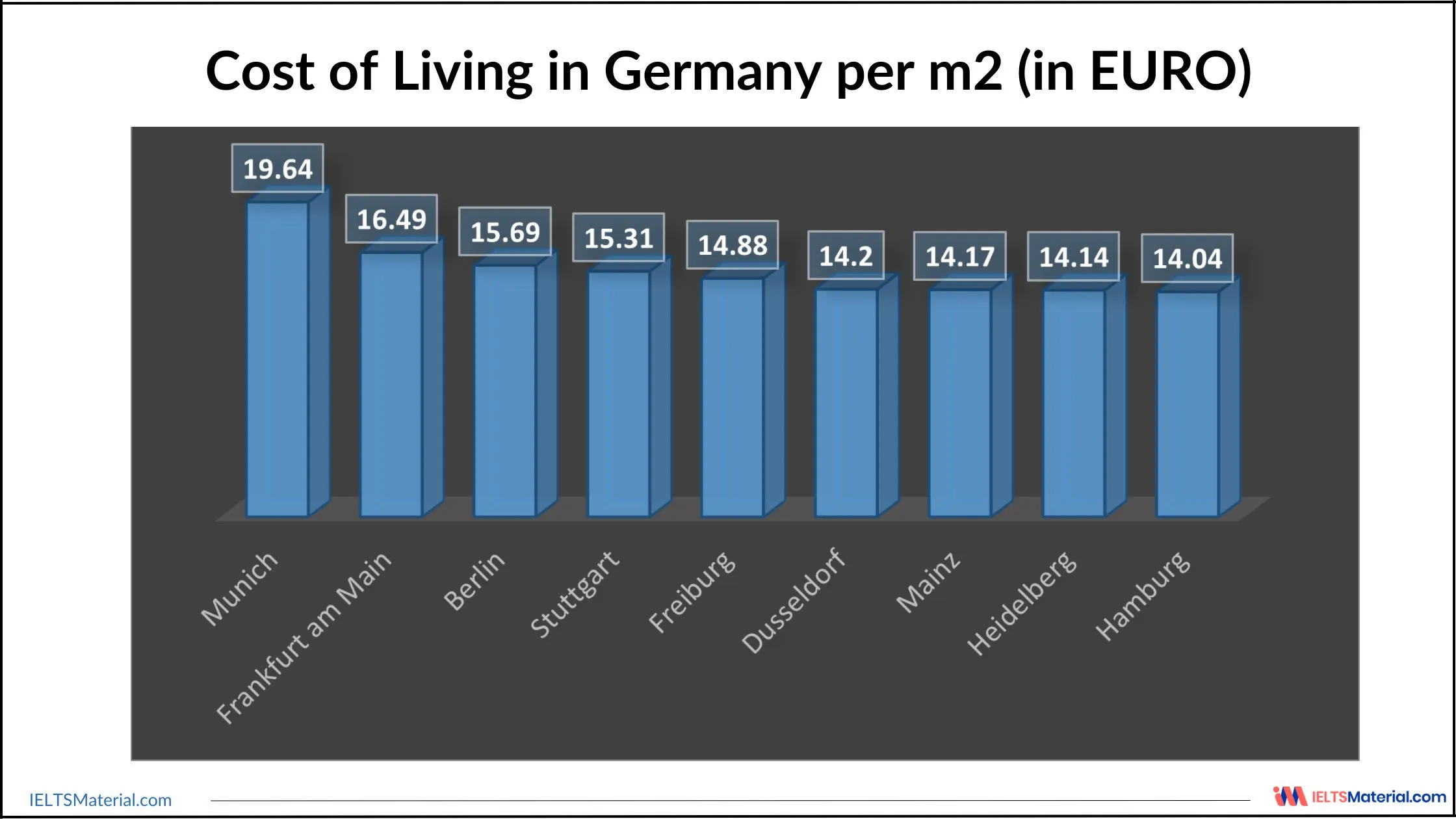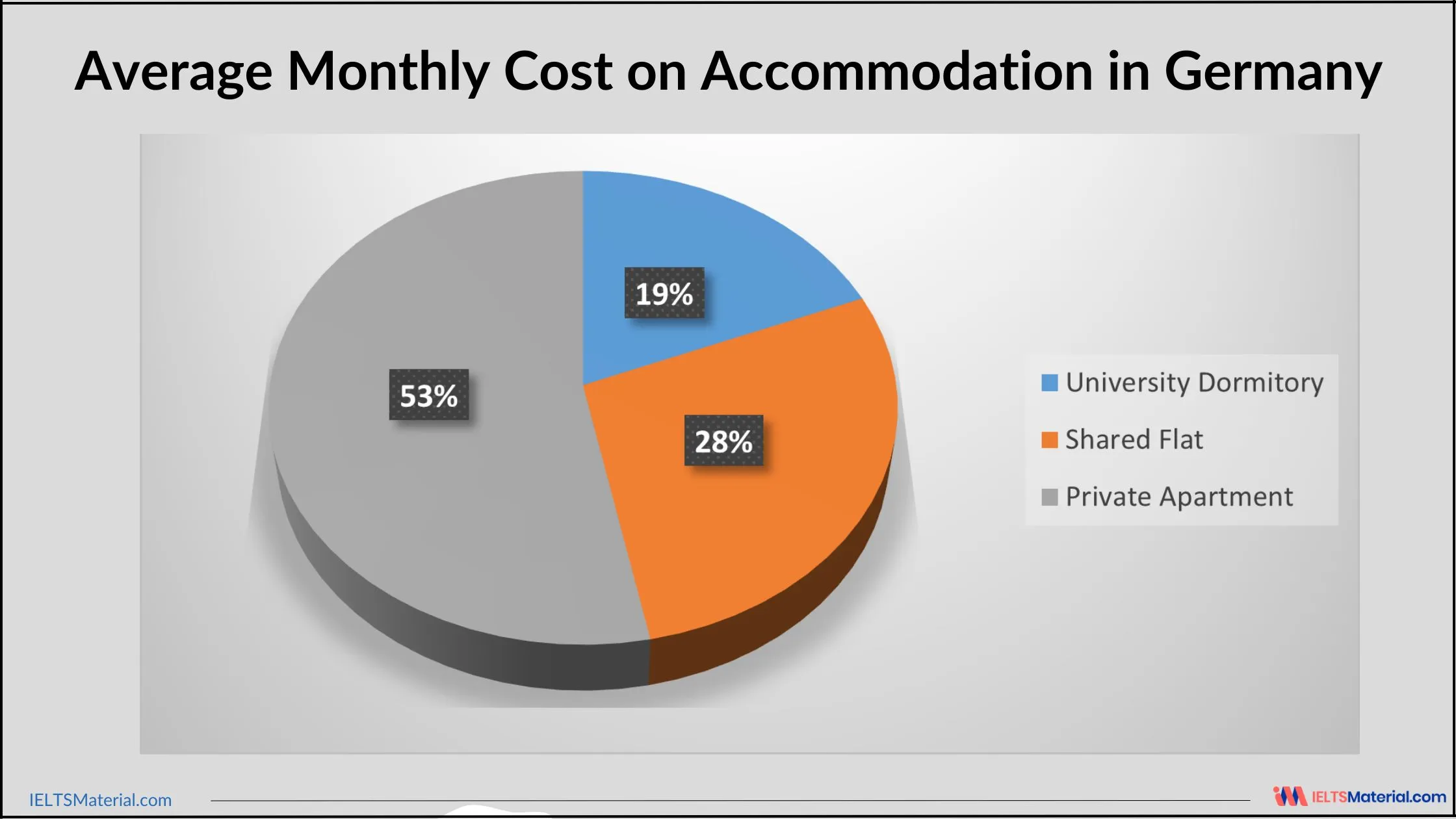Cost of Living in Germany for Indian Students and Expats in 2026
7 min read
Updated On
-
Copy link
This article details the cost of living in Germany for Indian students, covering expenses like accommodation, food, transportation, and health insurance. It also offers tips on reducing costs and managing finances effectively.
Table of Contents

Limited-Time Offer : Access a FREE 10-Day IELTS Study Plan!
Germany boasts a moderate cost of living compared to other Western European nations. Here, the cost of living is influenced by factors such as the city you live in, your accommodation type, and your spending habits. According to recent data, the average monthly cost of living in Germany for a student ranges between €800 and €1,400.
Average Monthly Cost of Living in Germany
Here’s a breakdown of the key components that contribute to Germany living expenses:
| Category of Expenses | Average Monthly Cost for Individual (in Euro) | Average Monthly Cost for a Family of 4 (in Euro) |
|---|---|---|
| Accommodation | 300-800 | 800-1500 |
| Food and Drinks | 150-250 | 400-600 |
| Transportation | 80-120 | 150-200 |
| Health Insurance | 120-130 (for student) | Varies depending on plan |
| Utilities | 50-80 | 80-120 |
| Miscellaneous (Communication & Entertainment) | 100-200 | 140-210 |
It’s important to note that individuals have varying needs and spending habits. For instance, purchasing food exclusively from an organic supermarket will result in higher grocery bills. Conversely, using public transport or a bicycle for commuting will be more economical compared to driving a car. Families also face additional expenses, such as clothing, toys, and possibly kindergarten fees for their children.
Thus, while the average cost of living in Germany serves as a useful guide, actual expenses can differ widely from person to person.
Seek guidance from experts to meet the necessary language requirements for Germany
City-Wise Living Cost in Germany for Indian Students

The cost of life in Germany can vary significantly depending on the city you choose to study in.
The following section provides a city-by-city breakdown of life expenses in Germany, which may help Indian students like you decide where to study and how to budget their finances.
Berlin
Berlin, the vibrant capital of Germany, offers a relatively affordable cost of living compared to other major European capitals. It is known for its diverse cultural scene, historical landmarks, and dynamic student life.
| Expense Category | Monthly Cost (EUR) |
|---|---|
| Accommodation | 500 – 1,200 |
| Food and Groceries | 200 – 300 |
| Transportation | 80 – 100 |
| Health Insurance | 120 –130 |
| Miscellaneous | 100 – 200 |
Munich
Munich, the capital of Bavaria, is one of the most expensive cities in Germany. It is known for its high standard of living, excellent universities, and the famous Oktoberfest.
| Expense Category | Monthly Cost (EUR) |
|---|---|
| Accommodation | 700 – 1,500 |
| Food and Groceries | 200 – 300 |
| Transportation | 70 – 100 |
| Health Insurance | 120 –130 |
| Miscellaneous | 100 – 200 |
Frankfurt
Frankfurt, a global financial hub, also has a higher cost of living. The city offers a cosmopolitan atmosphere, excellent job opportunities, and a diverse student community.
| Expense Category | Monthly Cost (EUR) |
|---|---|
| Accommodation | 600 – 1,400 |
| Food and Groceries | 200 – 300 |
| Transportation | 80 – 100 |
| Health Insurance | 120 –130 |
| Miscellaneous | 100 – 200 |
Hamburg
Hamburg, known for its port and maritime culture, offers a moderately expensive cost of living. The city is famous for its vibrant nightlife, cultural attractions, and excellent universities.
| Expense Category | Monthly Cost (EUR) |
|---|---|
| Accommodation | 500 – 1,200 |
| Food and Groceries | 200 – 300 |
| Transportation | 70 – 100 |
| Health Insurance | 120 –130 |
| Miscellaneous | 100 – 200 |
Stuttgart
Stuttgart, an industrial hub and home to several renowned universities, offers a balanced cost of living. The city is known for its automotive industry and picturesque surroundings.
| Expense Category | Monthly Cost (EUR) |
|---|---|
| Accommodation | 500 – 1,200 |
| Food and Groceries | 200 – 300 |
| Transportation | 70 – 100 |
| Health Insurance | 120 –130 |
| Miscellaneous | 100 – 200 |
Cologne
Cologne, known for its stunning cathedral and vibrant cultural scene, offers a relatively affordable cost of living. The city is popular among students for its lively atmosphere and excellent educational institutions.
| Expense Category | Monthly Cost (EUR) |
|---|---|
| Accommodation | 400 – 1,000 |
| Food and Groceries | 200 – 300 |
| Transportation | 70 – 100 |
| Health Insurance | 120 –130 |
| Miscellaneous | 100 – 200 |
Smaller Cities
Smaller cities such as Freiburg, Leipzig, and Dresden offer lower cost of living in Germany. These cities are known for their student-friendly environment, lower rent prices, and high quality of life.
| City | Accommodation (EUR) | Food and Groceries (EUR) | Transportation (EUR) | Health Insurance (EUR) | Miscellaneous (EUR) |
| Freiburg | 300 – 700 | 150 – 250 | 50 – 80 | 120 –130 | 100 – 200 |
| Leipzig | 300 – 700 | 150 – 250 | 50 – 80 | 120 –130 | 100 – 200 |
| Dresden | 300 – 700 | 150 – 250 | 50 – 80 | 120 –130 | 100 – 200 |
Ensure a smooth transition to Germany with a secured IELTS score.
Cost of Living in Germany for Indian Students
Indian students, like other international students, need to budget carefully to manage their finances while studying in Germany. Here’s an overview of the main expenses:
Tuition Fees
Germany is known for its affordable education system, especially at public universities where tuition fees are either very low or non-existent. However, private universities can be costly.
- Public Universities: Most public universities in Germany do not charge tuition fees for undergraduate courses. However, students need to pay a semester fee, typically ranging from €150 to €350, which covers administrative costs, public transportation, and other student services.
- Private Universities: Tuition fees at private universities can range from €5,000 to €20,000 per year.
Accommodation

Finding affordable accommodation is crucial. Options include university dormitories, private apartments, and shared flats (Wohngemeinschaft).
- University Dormitories: These are often the cheapest option, costing between €200 and €400 per month.
- Shared Flats (WG): Sharing an apartment with other students can cost between €300 and €600 per month.
- Private Apartments: Renting a private apartment is the most expensive option, with prices ranging from €500 to €1,200 per month depending on the city and apartment size.
Food and Groceries
On average, students spend around €150 to €250 per month on food and groceries. Cooking at home is more cost-effective than eating out.
Transportation
Public transportation is highly efficient and affordable. Many cities offer student discounts, and the semester fee often includes a public transport pass.
- Monthly Public Transport Pass: Costs between €60 and €100.
- Bicycle: A popular and economical choice for short distances.
Health Insurance
Health insurance is mandatory in Germany. Students typically opt for public health insurance, which costs around €120 – €130 per month.
Miscellaneous Expenses
Students should budget for entertainment, internet, phone bills, and other personal expenses, averaging around €100 to €200 per month.
Cost of Studying in Germany for International Students
Studying in Germany is an attractive option for international students due to its renowned education system, diverse academic offerings, and relatively low tuition fees compared to other countries.
Here’s a comparison of the average yearly international student tuition fees in Germany for different levels of study, along with a list of the top 10 cheapest universities for Indian students:
Average Yearly International Student Tuition Fees in Germany
Here’s an insight into tuition fees for international students in Germany:
| City | Undergraduate (EUR) | Postgraduate (EUR) | PhD (EUR) |
|---|---|---|---|
| Berlin | €34,000 – €49,000 | €35,000 – €52,000 | €38,000 – €55,000 |
| Munich | €30,000 – €47,000 | €31,000 – €46,000 | €33,000 – €48,000 |
| Frankfurt | €30,000 – €45,000 | €31,000 – €48,000 | €33,000 – €50,000 |
| Hamburg | €28,000 – €42,000 | €29,000 – €43,000 | €31,000 – €45,000 |
| Stuttgart | €27,000 – €41,000 | €28,000 – €42,000 | €30,000 – €44,000 |
Check Out – IELTS for German Universities | Study in Germany
Tips to Reduce Living Expenses in Germany
Living on a budget doesn’t mean compromising on quality of life. Here are some tips to help reduce your cost of living in Germany:
Choose Affordable Accommodation
University dormitories or shared flats (WG) often offer lower rental costs compared to private apartments. They also provide opportunities for socializing and making friends with fellow students.
Cook at Home
Cooking meals at home can save a significant amount of money compared to dining out. Additionally, purchasing groceries from discount supermarkets like Aldi, Lidl, and Penny can further reduce food expenses.
Use Public Transport
Public transportation in Germany is efficient and cost-effective. Many cities offer discounted public transport passes for students, which can result in substantial savings compared to owning and maintaining a car. Additionally, consider using a bicycle for shorter commutes to save on transportation costs.
Save on Textbooks
Textbooks can be expensive, but there are ways to save money. Consider buying second-hand books from online marketplaces or student forums. Additionally, utilize library resources, where possible, to access course materials for free or at a reduced cost.
Part-Time Jobs
Working part-time can help supplement your income and offset living expenses. International students from non-EU countries are allowed to work up to 140 full days or 280 half days per year in Germany. Look for opportunities such as student jobs, internships, or freelance work that can fit around your study schedule.
Health Insurance
Health insurance is mandatory for all students in Germany. While private health insurance may offer more comprehensive coverage, public health insurance is typically cheaper for students. Research and compare different health insurance plans to find one that fits your budget and meets your needs.
Student Discounts
Take advantage of student discounts available for various services and entertainment options in Germany. This includes discounts on public transportation, cultural events, museums, cinemas, and restaurants. Always carry your student ID card and inquire about available discounts wherever you go.
Budgeting Apps
Utilize budgeting apps to track your expenses, set financial goals, and identify areas where you can save money. These apps can help you monitor your spending habits, avoid overspending, and make informed financial decisions to stay within your budget.
By implementing these tips, international students can effectively manage their life expenses in Germany without compromising on their quality of life. With careful planning and budgeting, students can enjoy their time in Germany while pursuing their academic and personal goals.
To conclude, Germany offers an enriching and rewarding study abroad experience for Indian students. While the cost of living might seem higher initially, remember, Germany fosters a culture of exploration and adventure. With careful planning and budgeting, you can navigate the expenses and make the most of your time in Deutschland.
Are you an Indian student considering studying in Germany? Share your questions and concerns in the comments below!
Additional Reads
Frequently Asked Questions
Is it expensive to live in Germany?
Is 1000 euros enough for a month in Germany?
How much salary is enough to live in Germany?
How much does it cost to live in Germany for Indians?
Where do most Indians live in Germany?
Which city is best for Indians in Germany?
How many Indians go to Germany every year?
Is healthcare free in Germany?
Is education free in Germany for international students?
Is IELTS required for Germany?
Explore IELTS related articles

Start Preparing for IELTS: Get Your 10-Day Study Plan Today!
Recent Articles

Nehasri Ravishenbagam

Nehasri Ravishenbagam

Haniya Yashfeen





Post your Comments